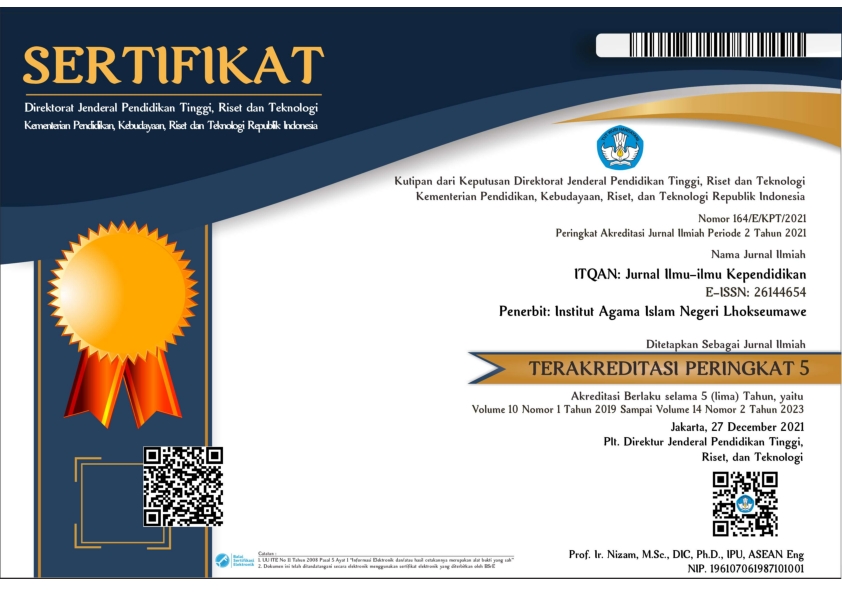Provision of Rewards and Punishments in Improving PAI Learning Outcomes at SMPN 2 Syamtalira Aron, Aceh
Main Article Content
Zulfikar Ali Buto
Taufiq Taufiq
Safruddin Safruddin
The learning delivered by Islamic Religious Education (PAI) Teachers often does not touch the motivation of students' learning, so that the learning process has not been able to improve learning outcomes as expected. This incident is not much different from that experienced by PAI teachers at Public Junior High School (SMPN) 2 Syamtalira Arun, which has an impact on poor learning outcomes due to the ability of PAI Teachers to encourage students to use punishment and reward methods that are in accordance with the conditions of their students. The research questions in this study are: 1) How is the implementation of the reward and punishment method to improve PAI learning outcomes? 2) What are the obstacles faced by PAI teachers? 3) How are the teachers' efforts in overcoming the existing obstacles? This type of research uses qualitative research with a phenomenological approach to the actual conditions of the research subject at the research location. Data collection techniques are carried out through observation, interviews, and documentation. Meanwhile, the data analysis techniques are data reduction, data presentation, and drawing conclusions. The provision of rewards and punishments in improving PAI learning outcomes at SMPN 2 Syamtalira Aron is carried out in various forms, for example, giving prizes and appreciation for those who excel and praise. Meanwhile, those who break the rules are given punishments that are educational both in groups and individually. The obstacles faced by PAI teachers in implementing rewards and punishments to improve PAI learning outcomes at SMPN 2 Syamtalira Aron are complex obstacles: 1) the students are mostly villagers, and most students are busy with activities to help their parents, 2) apathetic parents who do not want to know about their children's learning outcomes, 3) the obstacle is inadequate school facilities. The efforts made by PAI teachers in overcoming obstacles in implementing rewards and punishments to improve PAI learning outcomes at SMPN 2 Syamtalira Aron: 1) completing teaching administration, such as lesson plans, syllabus, media, and preparing learning materials; 2) activates the school MGMP (Subject Teachers Discussion).
Al-Jamali, M. F. (2003). Filsafat Pendidikan dalam Islam (4th ed.). Bina Ilmu.
Al-Qardawi, Y. (2001). Tarbiyah Al-Islam wa Madrasah Hasan al-Banna. Pustaka Setia.
Amir Daien Indrakusuma. (2002). Pengantar Ilmu Pendidikan. Usaha Nasional.
Arifin, M. (2003). Ilmu Pendidikan Islam (2nd ed.). Rajawali Perss.
Asri Budiningsih. (2005). Belajar dan Pembelajaran. Reneka Cipta.
Ching, G. S. (2012). Looking Into the Issues of Rewards and Punishment in Students. International Journal of Research Studies in Psychology, 1(2), 29–38. 10.5861/ijrsp.2012.v1i2.44.
Daulay, K., & Ritonga, M. A. (2022). Improving the Professionalism of Madrasah Teachers Post Covid-19. ITQAN: Jurnal Ilmu-Ilmu Kependidikan, 13(1), 1–14. https://doi.org/10.47766/itqan.v13i1.96.
Georgopoulos, B. S., & Tannenbaum, A. S. (1957). A Study of Organizational Effectiveness. American Sociological Review, 22(5), 534–540. https://doi.org/10.2307/2089477.
Hood, R. (2001). Capital Punishment: A Global Perspective. Punishment & Society, 3(3), 331–354. https://doi.org/10.1177/1462474501003003001.
Husak, D. (2011). Lifting the Cloak: Preventive Detention as Punishment. San Diego L. Rev., 48, 1173.
John M. Echols dan Hasan Shaldly. (1996). Kamus Inggris Bahasa Indonesia. Gramedia.
M. Ngalim Purwanto. (2006). Ilmu Pendidikan Teoritis dan Praktis. Remaja Rosdakarya.
Maag, J. W. (2001). Rewarded by Punishment: Reflections on the Disuse of Positive Reinforcement in Schools. Exceptional Children, 67(2), 173–186. https://doi.org/10.1177/001440290106700203.
Malik Fajar. (2005). Holistika Pemikiran Pendidikan. Raja Grafindo.
Malik, O. (2006). Kurikulum dan Pembelajaran. Bumi Aksara.
Moleong, L. J. (2009). Metodelogi Penelitian Kualitatif. Remaja Rosdakarya.
Nugroho, A. W., Subadi, T., & Fathoni, A. (2018). Pengelolaan Pendidikan Karakter Kemandirian Belajar pada Pembelajaran IPS di SMP Negeri 1 Tawangsari. Universitas Muhammadiyah Surakarta.
Nusche, D. (2008). Assessment of Learning Outcomes in Higher Education: A Comparative Review of Selected Practices.
Reskiana, R. (2019). Efektivitas Pemberian Punismet dan Reward terhadap Hasil Belajar Matematika Siswa Kelas X SMKN 3 Palopo. Institut Agama Islam Negeri Palopo.
Salabi, A. S. (2021). Konstruksi Keilmuan Islam (Studi Pemikiran Ibnu Rusyd tentang Ontologi dan Epistimologi). ITQAN: Jurnal Ilmu-Ilmu Kependidikan, 12(1), 47–66. https://doi.org/https://doi.org/10.47766/itqan.v12i1.188
Sardiman. (2007). Interaksi dan Motivasi Belajar Mengajar. Rajawali Perss.
Smedley, A., Morey, P., & Race, P. (2010). Enhancing the Knowledge, Attitudes, and Skills of Preceptors: An Australian Perspective. The Journal of Continuing Education in Nursing, 41(10), 451–461. https://doi.org/10.3928/00220124-20100601-08.
St Asriati, A. M., & Setiadi, M. A. (2021). The Students’ Perception of Rewards and Punishment toward Their Motivation in English Learning. English Language Teaching Methodology, 1(2), 130–139. https://jurnal.fkip.unismuh.ac.id/index.php/eltm/article/view/259.
Sujana, N. (2006). Teori Belajar dan Pembelajaran. Reneka Cipta.
Sukmadinata, N. S. (2010). Metode Penelitian Pendidikan. Remaja Rosdakarya.
Svanström, M., Lozano‐García, F. J., & Rowe, D. (2008). Learning Outcomes for Sustainable Development in Higher Education. International Journal of Sustainability in Higher Education. https://doi.org/10.1108/14676370810885925.
Syafruddin. (2019). Hasil Wawancara dengan Guru Pendidikan Agama Islam pada SMP Negeri 3 Syamtalira Arun.
Y. Roestiyah. (2001). Didaktik Metodik (V). Reneka Cipta.
Yusuf, A. M. (2014). Metode Penelitian Kuantitatif, Kualitatif, & Penelitian Gabungan, KENCANA. Jakarta. Deeplish.



